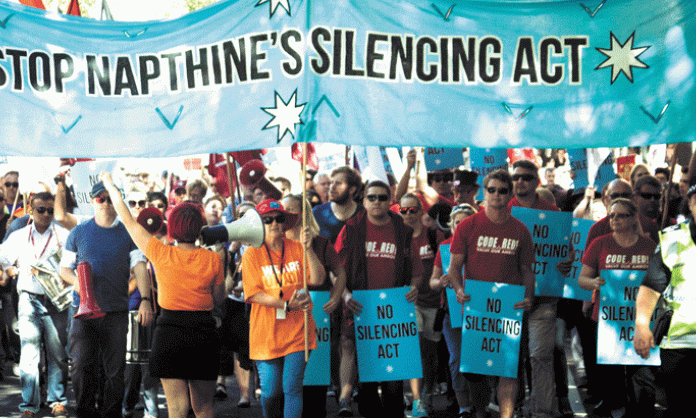The right to protest is under attack. In Western Australia, 76 construction workers have been summonsed to appear in court to face charges for attending a union-organised rally a year ago.
In Queensland, the government’s vicious anti-association laws have created such repressive conditions that, for some, gathering in numbers of three or more is an act of defiance. Solitary confinement and lengthy minimum jail terms await those who fall foul of the LNP’s expanding law and order regime.
In Victoria, the Napthine government is rushing through new laws that will enable police to outlaw pickets and protests. Under the amendments, peaceful protesters can be forced off the streets by police or protective services officers, who will be empowered to issue individuals or whole groups with a move-on order carrying the threat of arrest.
These laws remove existing protections for trade unionists picketing a workplace. For the first time, police will also be able to apply for a court-issued exclusion order that will make it an offence (punishable by up to two years in prison) for a person named in the order to return to or near a particular protest or picket.
The Victorian Trades Hall Council mobilised an estimated 4,000 to march on Parliament House in opposition. The rally, on 18 February, was a solid showing from a trade union movement clearly targeted by the changes. “These laws are wrong, they’re abhorrent and we’re going to fight them”, Trades Hall campaigns and industrial officer Luke Hilakari told Red Flag.
Speaking on the steps of Trades Hall at the start of the rally, the secretary of the Victorian branch of the Maritime Union of Australia, Kevin Bracken, argued that the point of the laws was to undermine unions’ ability to fight. “This is turning back the clock the way it was before the ’50s when we had the Masters and Servants Act. They want your children on their knees begging for a job”, he boomed to the vocal crowd.
Speaking later to Red Flag, Bracken said, “Parliament’s running an agenda for the benefit of very few people, and they want the ability to shut dissent down.”
Faye, a primary school teacher and member of the Australian Education Union, said she joined the rally because she’s been protesting since the moratorium marches against the Vietnam War in the early 1970s. “I believe in the right to protest, and teachers protest well! This is against all unions; everyone should be worried about the right to protest”, she said.
A 50-year veteran of the firefighters’ union, Rod Knowles, said that it was street demonstrations that years ago won firefighters the conditions they’re fighting to hold on to today. “We reserve the right to march down the street and let them know how we feel”, he said.
Roy, a shop steward with the ETU, said the reason he was marching was simple. “We’re union, and anything that goes against protesting pretty much goes against everything we believe in.”





